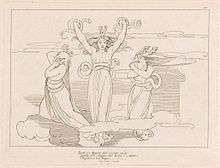Megaera
| Megaera | |
|---|---|
| Jealousy and envy | |
 "Questa e megera dal sinistro canto", front the Divine Comedy, 1793 printing | |
| Personal information | |
| Parents | Uranus or Nyx |
| Siblings | Alecto and Tisiphone |
Megaera (/məˈdʒɪərə/; Ancient Greek: Μέγαιρα, English translation: "the jealous one"[1]) is one of the Erinyes, Eumenides or "Furies" in Greek mythology. Lamprière's Classical Dictionary states "According to the most received opinions, they were three in number, Tisiphone, "Megaera ... daughter of Nox and Acheron",[2] and Alecto".[3]
Megaera is the cause of jealousy and envy, and punishes people who commit crimes, especially marital infidelity. Like her sisters Alecto and Tisiphone, as well as the Melian Nymphs, she was born of the blood of Uranus when Cronus castrated him.[4]
In modern French (mégère), Portuguese (megera), Modern Greek (μέγαιρα), Italian (megera) and Russian (мегера), this name denotes a jealous or spiteful woman - Google translates all five as "shrew".
Modern reception
Thorne Smith includes a character Megaera (mostly referred to as "Meg") in The Night Life of the Gods (1931). Despite the presence in the story of Neptune, Mercury, Venus and other immortals, she does not date from Classical times, was born around 1000, and has a character almost diametrically opposed to that of her namesake.
See also
References
- ↑ Related to μεγαίρω "to grudge, envy" from Proto-Indo-European *meǵh2- "great" (see R. S. P. Beekes, Etymological Dictionary of Greek, Brill, 2009, p. 917).
- ↑ Lamprière's Classical Dictionary of Proper Names mentioned in Ancient Authors, 1949, p. 366
- ↑ Lamprière's Classical Dictionary of Proper Names mentioned in Ancient Authors, 1949, p. 234
- ↑ Graves, Robert (1960). The Greek Myths. London: Penguin Books. p. 37. ISBN 9780140171990.